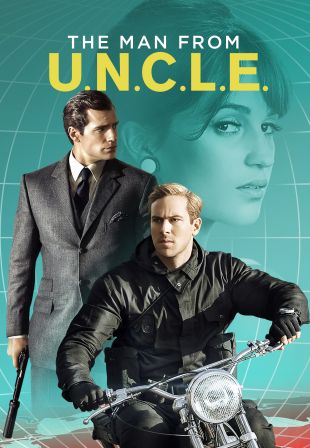
The Man From U.N.C.L.E., Guy Ritchie's slick, stylish, but ultimately empty spy caper, is a curious enterprise. Perhaps most curious is the fact that there is no "man from U.N.C.L.E." in the movie. The United Network Command for Law and Enforcement, an international spy agency featured in the popular 1960s espionage series, doesn't exist in the film, and is instead relegated to a brief mention in the end credits. Those unfamiliar with the TV show that starred Robert Vaughn and David McCallum as U.N.C.L.E. agents, which is likely to be anyone under the age of 50, will likely walk away from this movie wondering what U.N.C.L.E. is all about. Even worse: After watching this only mildly entertaining spy yarn, he or she may not care.
The film starts out well enough, as dapper American CIA agent Napoleon Solo (Henry Cavill) tries to help Gaby Teller (Alicia Vikander), a pretty East German auto mechanic, escape to the West over the Berlin Wall in 1963. Gaby is also the daughter of Hitler's favorite rocket scientist, who is supposedly developing a nuclear bomb for a nefarious group, albeit against his will. Solo's mission is to reunite Gaby with her estranged father in Italy, get him to stop his potentially catastrophic work, and retrieve a disc that contains the blueprints for building the nuclear weapon. Unfortunately for Solo, KGB agent Illya Kuryakin (Armie Hammer) has been assigned the exact same mission. During a rousing and amusing car chase, the two rival spies get well acquainted as they try to outwit and kill each other, with Solo ultimately winning out as he and Gaby use a zip line to fly over the Berlin Wall, leaving Kuryakin fuming on the other side. The U.S. and the Soviet Union soon decide to temporarily put aside their ideological differences and work together to prevent nuclear annihilation, which means that Solo and Kuryakin are forced to be partners; understandably, they're very reluctant to agree to this idea. All in all, this is a great setup for both a spy thriller and an origin story about how two disparate agents learn to work together.

But the movie loses its footing once Napoleon and Illya become comrades, as it begins to concentrate more on looking cool and invoking laughter than spinning an involving espionage tale. The hip, retro sets, period-perfect costumes, and gorgeous Italian locations are indeed stunning, which makes it all the more disappointing that they're in service of such a bland story. It doesn't help that Cavill is never believable as a spy. His Solo is certainly suave and sophisticated, as was his TV counterpart, but he's also superficial; he's too cool and detached for his -- or the movie's -- own good. Hammer fares somewhat better, although his shaky Russian accent is never quite convincing. Both men are outshined by Vikander, who brings a tender intelligence to her role as the woman caught in the middle of a dangerous mission not of her making, and by a great supporting cast that includes Elizabeth Debicki as the film's mod villain and Hugh Grant as a devilish British intelligence chief.
The Man From U.N.C.L.E. TV series was conceived in response to the success of the early James Bond movies; in fact, it was originally titled Ian Fleming's Solo, since the 007 author created the character of Napoleon Solo when he was initially involved in the show's development. The Bond franchise is, of course, still going strong, and while The Man From U.N.C.L.E. TV series ended decades ago, it's obvious that Warner Bros. wants to turn U.N.C.L.E. into a lucrative movie franchise of its own. Unfortunately, Ritchie's underwhelming feature might end up being nothing more than a solo venture.
